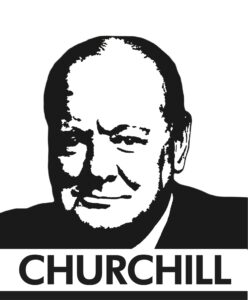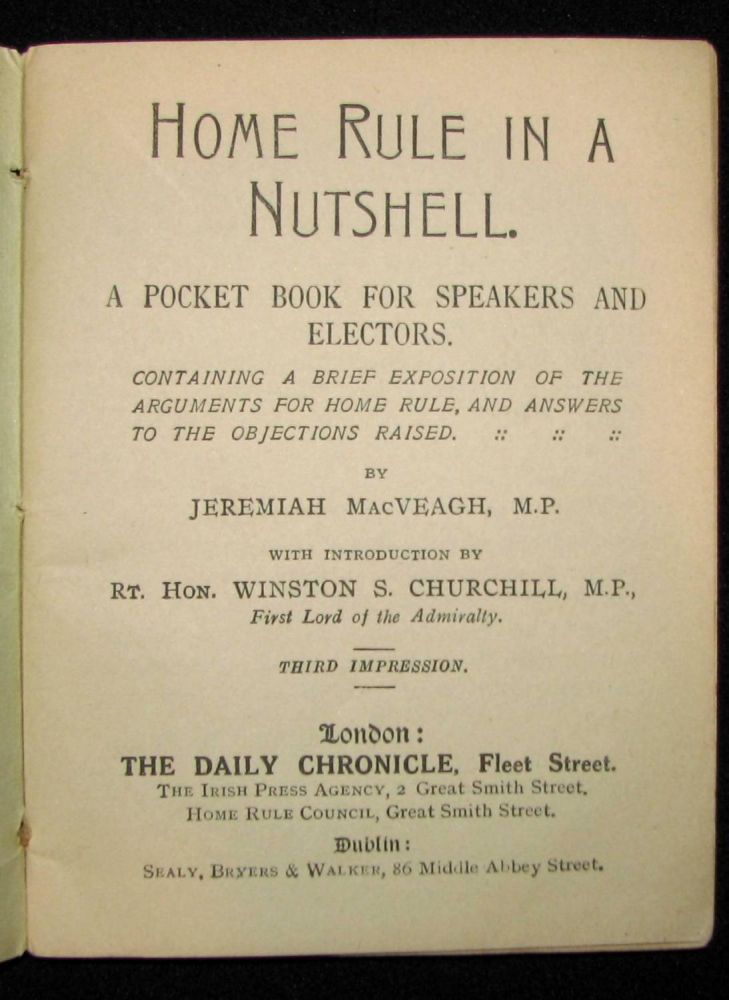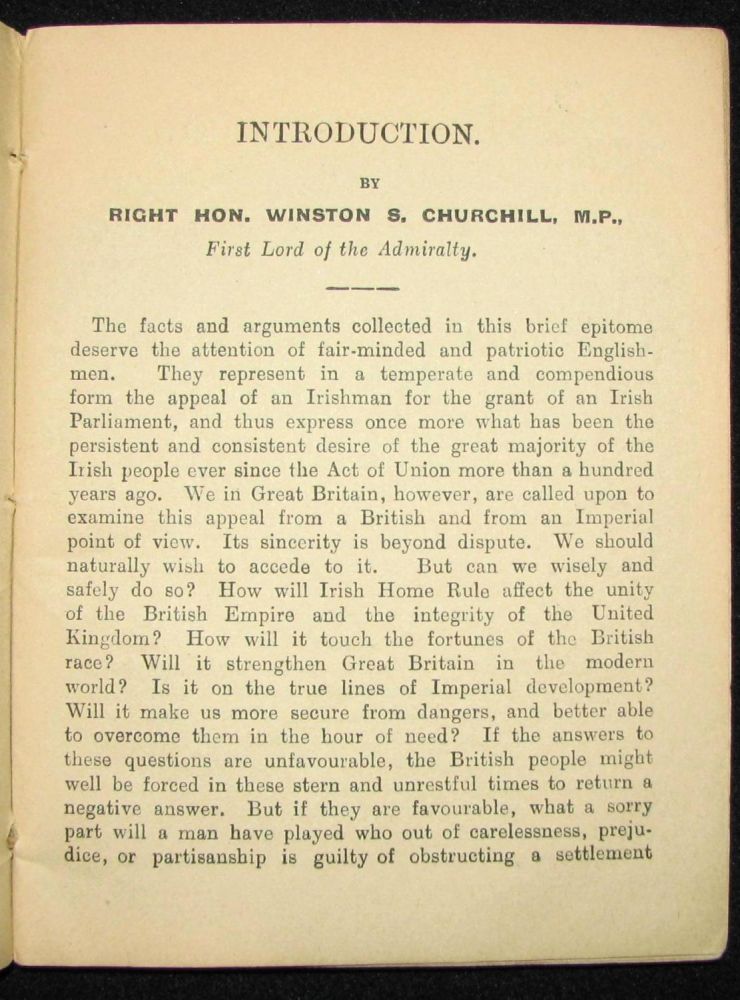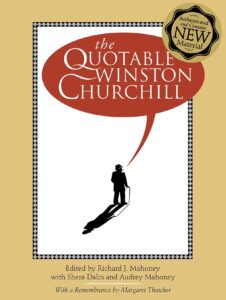
Finest Hour 197
Cohen Corner

Photos courtesy of the Churchill Book Collector
March 31, 2024
Churchill’s Introduction to Home Rule in a Nutshell
Finest Hour 197, Third Quarter 2022
Page 40
By Ronald I. Cohen
Ronald I. Cohen CM MBE is author of Bibliography of the Writings of Sir Winston Churchill (2006).
Home Rule in a Nutshell was first published in November 1911 by Sealy Bryers & Walker of Dublin. It was a “a pocket book for speakers and Electors,” prepared by Jeremiah MacVeagh, an Irish nationalist politician, who was elected for the Irish Parliamentary Party in South Down in 1902, 1906, and the two general elections of 1910.
In his preface to the pamphlet, MacVeagh explained that he had “endeavoured to present a bird’s-eye view of the case for Home Rule for Ireland.” His objective was to “collate the facts in a popular form, and to leave the reader to follow up in other quarters any particular branch of the subject which may appeal to him.”

An introduction by Winston Churchill, then serving as First Lord of the Admiralty, was added to the “revised and enlarged” third edition of the booklet, which was published on 9 January 1912 in London by the Daily Chronicle. Sealy, Bryers & Walker continued to be designated as the publisher in Dublin, but now placed in a clearly subordinated position on the cover and title page.

2025 International Churchill Conference
On 8 January, an abridged version of Churchill’s introduction appeared in the Daily Chronicle, the Manchester Guardian, and The Times. Finally, a fourth edition, also containing Churchill’s introduction and described as “revised, enlarged and reset,” was published in 1912 in both London and Dublin.
Churchill’s Introduction
The facts and arguments collected in this brief epitome deserve the attention of fair-minded and patriotic Englishmen. They represent in a temperate and compendious form the appeal of an Irishman for the grant of an Irish Parliament, and thus express once more what has been the persistent and consistent desire of the great majority of the Irish people ever since the Act of Union more than a hundred years ago. We in Great Britain, however, are called upon to examine this appeal from a British and from an Imperial point of view. Its sincerity is beyond dispute. We should naturally wish to accede to it. But can we wisely and safely do so? How will Irish Home Rule affect the unity of the British Empire and the integrity of the United Kingdom? How will it touch the fortunes of the British race? Will it strengthen Great Britain in the modern world? Is it on the true lines of Imperial development? Will it make us more secure from dangers, and better able to overcome them in the hour of need? If the answers to these questions are unfavourable, the British people might well be forced in these stern and unrestful times to return a negative answer. But if they are favourable, what a sorry part will a man have played who out of carelessness, prejudice, or partisanship, is guilty of obstructing a settlement earnestly desired by the Irish people, and politic and necessary in itself!
It is because we believe that the answers to these questions will be found to be extremely reassuring to all who examine the Home Rule question with sincerity, that we confidently anticipate a good and enduring arrangement. The House of Commons is overwhelmed with unsifted business. Home Rule will relieve it. The British Parliamentary system is not sufficiently representative of the local and provincial life of the nation. Home Rule all round will, by opening other roads to political distinction, notably enrich it. New and vivifying pulses will begin to beat, and the new nerve centres of a higher organism will spring into being. The two greatest modern States with whom we have to compete, the German Empire and the American Union, are to-day administered respectively through 23 and 46 separate but subordinate Parliaments. And this is the only way by which the whole strength of a twentieth century community can be effectually applied to government and progress.
It is idle to argue that centralisation is right, or that devolution is right. These terms are purely relative. Neither is exclusive. Either separately would be wrong. The truth resides in a harmonious combination of the two. The movement of the modern world is not towards the concentration of millions of individuals upon a single centre, but the consolidation around that centre not of individuals, but of other perfectly formed subsidiary centres. This is the true type and model alike of the great modern nation, and of the extended Empire, in which both Devolution and Centralisation must proceed simultaneously or successively to a harmonious balance, in which all services necessary to national or Imperial unity and strength are ever more highly centralised, and in which all other business not affecting the whole body is continually devolved to lesser centres which become themselves in natural freedom the replenishing cells of energy and life.
Truly comprehended, many groups or phenomena are seen to relate to the same fundamental principles. The balance of divided functions described above is noticed in industrial economics as the division and combination of labour. It is the essence of every effective military organisation. Even a unit so small as a cavalry squadron conforms to it. Although here all training seeks to procure the maximum of cohesion for a single attacking line, yet each troop is within its proper scope autonomous and self-contained, and each drills and dresses by its own centre guide and troop leader. It is only after this first indispensable stage has been established that the superior grouping is attempted, and it is only because the first stage has been attained that the larger formation becomes possible. Who has not heard of the glories of the Union Brigade at Waterloo? How often has its fame been proclaimed as an example of Unionism? Yet, there never was a body which was more essentially Federal in its character. Each of its three regiments, the Royals, the Inniskillings, and the Greys, was organised separately, under its own officers, with its own interior economy, and with its own traditions, upon a national basis, and then, and not till then, combined together. It is not intended to press this analogy too far. But to what a nondescript and unwieldy mob would a general have reduced that noble brigade, who had sought to eliminate the principle of nationality, and to melt the three component regiments into one single mass of red-coated cavalry soldiers! To march with the movement of the ever-growing world, to stand the strain of an ever tenser competition, it is vitally necessary that we, like our most formidable rivals, should know how to combine the fullest expression of national and local aspirations and activities with the strongest framework of Imperial unity. We can do it if we try; and we can do it now.
As the latest century unfolds the whole world to our eyes, the larger syntheses are revealed. We see the four consolidations of the human family which, measured in terms of energy and force, realised or latent, are in the ascendant—the Russian power, the Yellow races, the Teutonic alliance, and the English-speaking peoples. There is no solution of a political question which would give more unaffected pleasure than the grant of Home Rule through all the self-governing dominions of the British Empire. We must not, as Lord Salisbury in his last great speech reminded us, expect that the vast developments which the mind foresees will take place within the compass of our own short lives. But still it must always be a guiding star of British statesmanship, not only to federate that Empire, but to draw nearer in bonds of friendship and association to the people of the United States. We have seen even in the last fifteen years very great and good changes take place, altering sensibly the point of view from which the two nations regard each other. The reconciliation of the English and the Irish peoples is all that is needed to still the last voices of antiquated hostility. The road to the unity of the English-speaking races, with all that that carries with it, is, no doubt, a long one, and we cannot see the end of it. But it is an open road, and an Irish Parliament, loyal to the Crown and free to make the best of the Emerald Isle, is assuredly the first milestone upon it.
Subscribe
WANT MORE?
Get the Churchill Bulletin delivered to your inbox once a month.





